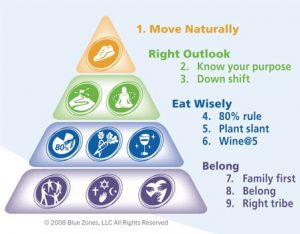 The research on the Blue Zones teaches us that nine daily lifestyle choices underpin living longer and living better. Three of the nine factors driving good health are food related: eating wisely through stopping when you’re 80% full, choosing more plant-based foods, and moderate wine consumption.
The research on the Blue Zones teaches us that nine daily lifestyle choices underpin living longer and living better. Three of the nine factors driving good health are food related: eating wisely through stopping when you’re 80% full, choosing more plant-based foods, and moderate wine consumption.
My time spent in Italy makes it clear that living a Blue Zone life- and eating-style is natural and accessible in this country. It’s much harder to do this in many regions of the U.S.
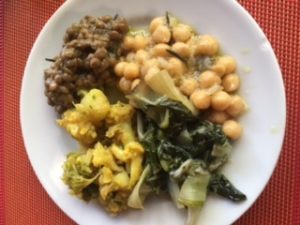 I’m more involved these days in food-as-medicine as my work advising healthcare stakeholders has morphed toward working with organizations that want to bake more of the social determinants of health into American healthcare. This week of learning has culminated in a Slow Food extravaganza with one of Florence’s major players in food: the Cibreo organization, which is led by Fabio Picchi. Today, we savored and appreciated what real food, mostly plants (à la Michael Pollan), cooked with love and purpose, can do for overall health, wellness, and happiness.
I’m more involved these days in food-as-medicine as my work advising healthcare stakeholders has morphed toward working with organizations that want to bake more of the social determinants of health into American healthcare. This week of learning has culminated in a Slow Food extravaganza with one of Florence’s major players in food: the Cibreo organization, which is led by Fabio Picchi. Today, we savored and appreciated what real food, mostly plants (à la Michael Pollan), cooked with love and purpose, can do for overall health, wellness, and happiness.
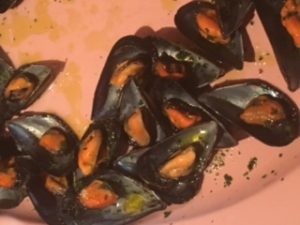 The setting for this was Cibreo’s Teatro del Sale, and our guide on this journey was Andrea, who lovingly presented and explained the many courses and plates we savored.
The setting for this was Cibreo’s Teatro del Sale, and our guide on this journey was Andrea, who lovingly presented and explained the many courses and plates we savored.
Prior to experiencing this extensive and delectable “food theatre,” we took in a tour of the Sant’Ambrogio market that features that zero kilometre local food in the form of the most colorful, fresh fruits and vegetables, poultry, fish, meats, cheeses, oils, vinegars, and of course, some 73 “DOCGs” of Italian wine, as Andrea, a sommelier, informed us. (The DOCG is the designation for the Denomination of Controlled and Guaranteed Origin, such as Barolo and Chianti, along with 71 others).
There’s one aspect of the Blue Zones advice we did not heed today, as you might guess: stopping at being 80% full! Thankfully, blessedly, the top of the pyramid is to “move naturally,” so a long walk helped to mitigate the huge, glorious meal we consumed.
Grazie to the Cibreo Teatro del Sale team and tribe! We are truly members of this club.
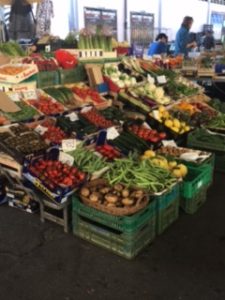 Health Populi’s Hot Points: Zero-kilometer eating means finding food that comes from as close to home as possible. It’s a form of food crossed with location-location-location, the theory being that the closer your food comes from your home, the cleaner and less processed it will be. This is a good general rule, and can have some exceptions depending on how your local food was raised.
Health Populi’s Hot Points: Zero-kilometer eating means finding food that comes from as close to home as possible. It’s a form of food crossed with location-location-location, the theory being that the closer your food comes from your home, the cleaner and less processed it will be. This is a good general rule, and can have some exceptions depending on how your local food was raised.
One of my go-to nutritionists is Ashley Koff, RD, who taught me about being a “qualitarian.” You’ve heard of vegetarians, vegans, even pescaterians. Qualitarians seek the best food they can find within budgets and neighborhoods.
Some exciting developments are emerging in the US leveraging existing life-flows and technologies people use every day to make life easier, more accessible, and cost-saving. Consider the “Amazon-Prime’ing” of America and American lifestyles that I discussed here in Health Populi.
Amazon and other food delivery services have begun to work with residents in food deserts and communities that lack supply of fresh food (and especially produce, fresh fruits and vegetables).
This is one way to “go fast to go Slow,” as in Slow Food and accessing real, clean food.
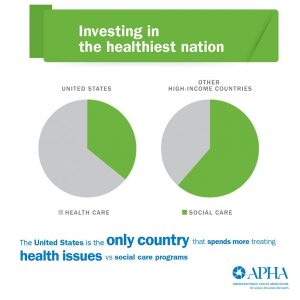 To be sure, the social determinants of health go beyond food: for example, today we also walked for miles, took in great art, got some warm hugs, expressed our spirituality, and felt part of something larger than ourselves: that is, connected. As Christakis and Fowler’s research has found, feeling connected in positive ways enhances health; loneliness is a risk factor for poor health.
To be sure, the social determinants of health go beyond food: for example, today we also walked for miles, took in great art, got some warm hugs, expressed our spirituality, and felt part of something larger than ourselves: that is, connected. As Christakis and Fowler’s research has found, feeling connected in positive ways enhances health; loneliness is a risk factor for poor health.
Remember that the US spends much more on healthcare than social care, per capita, than any other wealthy country — whose health outcomes far outshine America’s. The evidence for investing in social determinants of health is overwhelming. It’s also sensible and life-affirming.





 Interviewed live on BNN Bloomberg (Canada) on the market for GLP-1 drugs for weight loss and their impact on both the health care system and consumer goods and services -- notably, food, nutrition, retail health, gyms, and other sectors.
Interviewed live on BNN Bloomberg (Canada) on the market for GLP-1 drugs for weight loss and their impact on both the health care system and consumer goods and services -- notably, food, nutrition, retail health, gyms, and other sectors. Thank you, Feedspot, for
Thank you, Feedspot, for  As you may know, I have been splitting work- and living-time between the U.S. and the E.U., most recently living in and working from Brussels. In the month of September 2024, I'll be splitting time between London and other parts of the U.K., and Italy where I'll be working with clients on consumer health, self-care and home care focused on food-as-medicine, digital health, business and scenario planning for the future...
As you may know, I have been splitting work- and living-time between the U.S. and the E.U., most recently living in and working from Brussels. In the month of September 2024, I'll be splitting time between London and other parts of the U.K., and Italy where I'll be working with clients on consumer health, self-care and home care focused on food-as-medicine, digital health, business and scenario planning for the future...